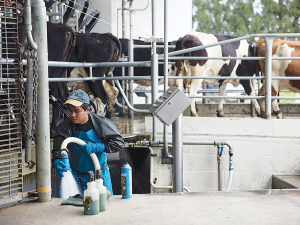The Government has approved border class exceptions for key agricultural jobs, including 200 mobile plant machinery operators, 40 shearers and 50 wool handlers.
Agriculture Minister Damien O'Connor said they made these exceptions to support key autumn harvest requirements and relieve workforce pressures created by COVID-19.
"We've also altered the existing class border exception for 200 dairy workers to remove the previous split of 150 assistant dairy farm managers and 50 dairy farm assistants. There's a huge demand for dairy farm assistants, so we're providing more flexibility for our dairy sector to fill jobs up to the maximum of 200 where they see the strongest need."
While the move has been welcomed by various sector groups, there is concern that the time and available space that these workers will need to spend in MIQ could negate any benefits.
Rural Contractors NZ chief executive Andrew Olsen says without more operators the sector was heading for a disaster in terms of lives, damaged machinery and lost production.
“The 200 extra operators we now have approved should take the sting out of what we need and we are grateful to the Ministers for that,” he says. “The key will be getting these workers in rapidly. If we are still idling in low gear in six weeks, the opportunity will have been lost.”
Olsen says he’s suggested to the Ministers that as many contractors and farmers live rurally and often accommodate their workers, there is the potential for required isolation to take place on the property.
“This would allow the new operators be able to perform their work in a non-contact manner much as we saw during level 4 lockdown for essential service workers,” Olsen explains.
“There is still pressure on MIQ facilities and this way we could avoid some of the MIQ lolly scramble, minimise costs and get our desperately needed imported staff to work sooner.”
He says there is already discussion with both MPI and MBIE about the need for a simpler visa process for the incoming workers to avoid some the “rigmarole’ that saw delays in the time sensitive travel paperwork for the 125 skilled machinery operators from overseas already here for the 2021/22 season.
DairyNZ says it is relieved the Government has listened to its call to allow more dairy farm assistants into New Zealand in January 2022.
However, the industry-good organisation says more workers are needed and is continuing to push for another 1500 dairy international workers to be let into the country for the 2022 dairy season.
It says these workers will help alleviate crippling staff shortages that are having a serious impact on farmer wellbeing.
O’Connor concedes that there are still labour challenges across the sector and says the Government will continue working with the sector to meet them where possible.
“We’re continuing discussions with the meat sector on how to address their labour needs, particularly regarding halal slaughterers.”











